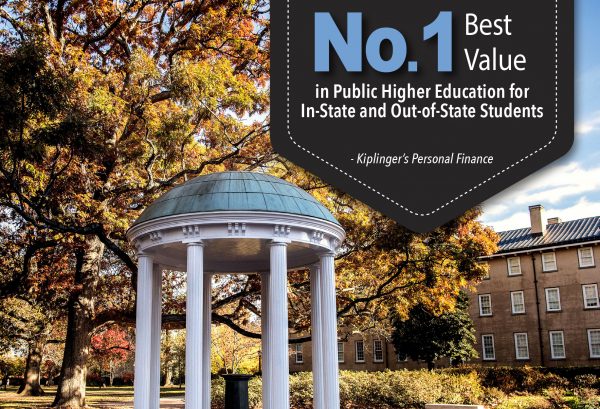Carolina No. 1 in best college value
The ranking by Kiplinger’s Personal Finance is based on high-quality education and affordability. This is the 16thtime the nation’s first public university is also first in value.

Once again, the University of North Carolina at Chapel Hill is the best value in American public higher education, according to Kiplinger’s Personal Finance.
Recognized for upholding academic quality and affordability, Carolina takes the top ranking among public colleges in two categories: Best in-state and best out-of-state value. In the overall ranking of the 300 best-value colleges and universities, UNC-Chapel Hill moves up one spot to 9th.
“Providing an excellent and affordable education is a hallmark of our 223-year history,” said Chancellor Carol L. Folt. “Once again being recognized as the best value in American public higher education demonstrates the success of Carolina’s unwavering commitment to making the opportunities that come from attending a leading university available to students without burdening them with excess debt after graduation.”
Rounding out the top three for best values in public colleges: The universities of Virginia and California at Berkeley. Taking the top spot in the combined best values list is Swarthmore College, followed by Davidson College and Princeton University.
The magazine rankings are based on its definition of value, which is: A quality education at an affordable price. Some of the key measures for quality are: admission rates; the percentage of students who return sophomore year; graduation rates; test scores of incoming freshmen and student-to-faculty ratios. As for the financial measures, the magazine considers overall cost of tuition; the cost of books; room and board; the average percentage of need met by aid and the average debt a student accumulates before graduation.
Nationally, 68 percent of students borrow money to pay for college and on average graduate $30,100 in debt. That’s compared to 41 percent of students at UNC-Chapel Hill who borrow money to attend the University. The average amount of debt for those graduating students: $20,127.
Currently, 44 percent of students at the University receive financial aid through signature, nationally recognized programs like the Carolina Covenant, which has offered more than 6,000 low-income students who earn admission the chance to graduate debt free. In 2015, 60 percent of seniors graduated with no debt. Another program, Carolina Firsts creates a path of opportunity for the 20 percent of undergraduates who will be the first in their families to graduate from a four-year campus.
In 2016, UNC-Chapel Hill’s four-year graduation rate was 82 percent, up 8 percentage points since 2005. The six-year rate was 91.4 percent and rose by more than 5 percentage points.
The magazine’s special report on best college values for 2017 and the complete rankings can be found online and also in the February 2017 issue of Kiplinger’s Personal Finance, on newsstands January 3rd.




